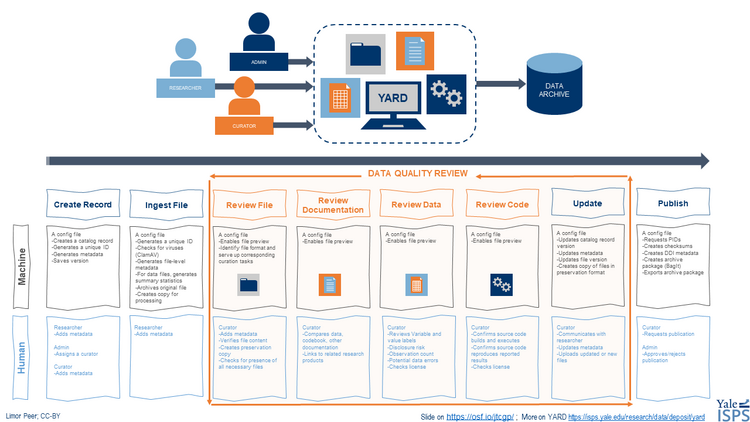Curating for Reproducibility
ISPS believes that it has both responsibility and expertise to assist researchers who wish to disseminate and archive research products that support published scientific claims, and has created a process to ensure computational reproducibility.
The ISPS process, which aligns data curation with quality review, has been influential and informed the development of similar practices in other social science data archives who recently joined together under a consortium called Curating for Reproducibility (CURE). In 2019, CURE received a grant from the Institute of Museum and Library Services (IMLS) Laura Bush 21st Century Librarian Program to define the necessary skills for this type of work and to develop an evidence-based training program focused on data curation for reproducibility for librarians and archivists.
Data Quality Review
The ISPS Data Archive curation process implements the data quality review framework.
“A data quality review is a process whereby data and associated files are assessed and required actions are taken to ensure files are independently understandable for informed reuse. This is an active process, involving a review of the files, the documentation, the data, and the code. We strongly believe that data quality cannot be realized without a data quality review.” Peer, Green, & Stephenson, 2014
YARD at ISPS
YARD (Yale Application for Research Data) is an open-source web application for reviewing and enhancing research outputs. The software structures the data curation and code review workflow, contributing to research transparency and reproducibility. In addition to traditional curatorial tasks, dedicated data curation staff replicate analyses and validate published results for each study before publishing the files online.
At Yale, the tool as currently configured is feeding into the Institution for Social and Policy Studies’ ISPS Data Archive and intended for the use of ISPS affiliates.
YARD at ISPS enables open access to research materials that have been fully reviewed and enhanced for long-term reuse, and geared toward research output from randomized trials in the social sciences.
Rights
Publicly available digital content in the ISPS Data Archive is licensed under a Creative Commons Attribution-Non Commercial-No Derivatives 3.0 United States Public License 2010, Yale University, New Haven, Connecticut, United States. Exclusions:
- Restricted-access files held in the ISPS Data Archive are excluded from this license.
- Third party content that is used, with permission, by ISPS, is excluded from this license.
The ISPS Data Archive respects the intellectual property rights and other proprietary rights of others. The ISPS Data Archive may, in appropriate circumstances and at its discretion, remove certain files or disable access to files that appear to infringe the copyright or other intellectual property rights of others. Notice to Copyright Holders: The creators of the ISPS website have made every effort to secure permission to use the works of others on the Research section of the ISPS website. Any use of others’ works on this site is the result of either explicit permission from the copyright owner, a good faith belief (following investigation) that the work is in the public domain, or a fair use for purposes of research and scholarship under copyright laws. See 17 U.S. Code §107. Our goal is to make information and resources available to the community; we have no intent to offend anyone’s ownership rights in intellectual property. If you are a copyright claimant with regard to any work on this site, and you object to our use of it, please contact Limor Peer, Assistant Director for Research at the Institution for Social and Policy Studies.
Access and Confidentiality
The ISPS Data Archive currently allows two levels of access: Public and Private. Public access means that any user can download a given file. Private access means that no user (including the data owner, author, or PI) can access a given file.
Responsibility regarding the restriction of access to data ultimately resides with the data owner. Authors and PIs are responsible to alert ISPS if public access to a file needs to be restricted, and have the ability to request an update a file’s status from private to public. Public data in the ISPS Data Archive are available for download directly from the ISPS website, in accordance with any access constraints set by the data owner.
Authors and PIs should notify ISPS Data Archive team if a data file contains confidential information or otherwise requires restricted access. Steps will be taken by ISPS Data Archive team to archive that data file with restricted access.
The default access for newly created metadata records in the ISPS Data Archive is to be publicly viewable, while the data files themselves are either public or restricted, depending on author or PI request. Publicly accessible metadata records are discoverable by search engines, and linked to from other parts of the ISPS web site.
ISPS takes the confidentiality of individuals whose personal information may be part of archived data very seriously, and takes steps to protect confidential information, including:
- Instructions to authors and contributors regarding how to prepare a data file for public access.
- Rigorous review of all datasets to assess disclosure risk
- Recode variables if necessary to protect respondents’ confidentiality
- Limiting access to datasets where risk of disclosure remains high
- Training of staff and consultation with data producers to reduce disclosure risk (the possibility that a data record in a study can be linked to a specific person thereby revealing information about that person that otherwise would not be known); see more resources at ICPSR.
Additional Resources:
- American Statistical Association, Data Access and Personal Privacy: Appropriate Methods of Disclosure Control
- Confidentiality and Data Access Committee (CDAC) forum for staff members of Federal statistical agencies
- Census Bureau Standard for Disclosure Review
- ICPSR
ISPS Research Support
ISPS aims to support its affiliates – faculty, post docs, graduate students, and fellows – in all their research needs in support of the ISPS mission to advance interdisciplinary research in the social sciences that aims to shape public policy and inform democratic deliberation.
More about ISPS research support.
